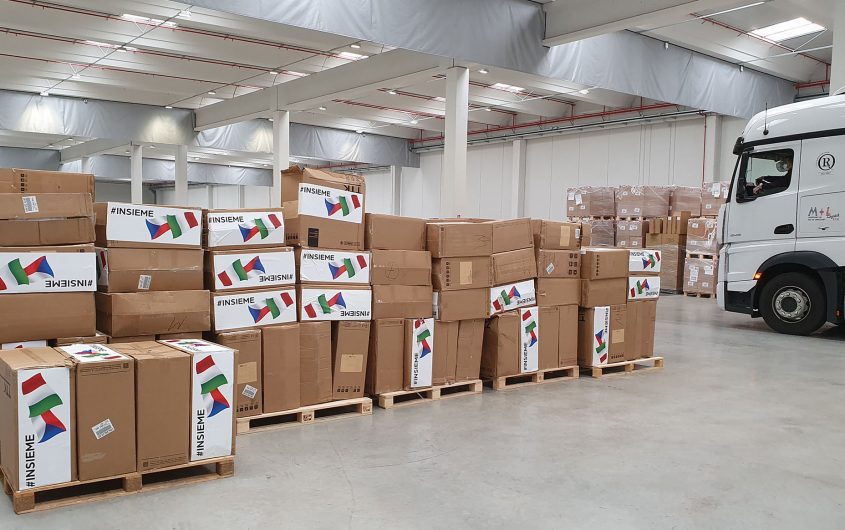
NATO via Flickr
From CARE Packages to Coronabonds: Will the EU Step Up?

Peter S. Rashish
Vice President; Director, Geoeconomics Program
Peter S. Rashish, who counts over 30 years of experience counseling corporations, think tanks, foundations, and international organizations on transatlantic trade and economic strategy, is Vice President and Director of the Geoeconomics Program at AICGS. He also writes The Wider Atlantic blog.
Mr. Rashish has served as Vice President for Europe and Eurasia at the U.S. Chamber of Commerce, where he spearheaded the Chamber’s advocacy ahead of the launch of the Transatlantic Trade and Investment Partnership. Previously, Mr. Rashish was a Senior Advisor for Europe at McLarty Associates, Executive Vice President of the European Institute, and a staff member and consultant at the International Energy Agency, the World Bank, UN Trade and Development, the Atlantic Council, the Bertelsmann Foundation, and the German Marshall Fund.
Mr. Rashish has testified before the House Financial Services Subcommittee on International Monetary Policy and Trade and the House Foreign Affairs Subcommittee on Europe and Eurasia and has advised three U.S. presidential campaigns. He has been a featured speaker at the Munich Security Conference, the Aspen Ideas Festival, and the European Forum Alpbach and is a member of the Board of Directors of the Jean Monnet Institute in Paris and a Senior Advisor to the European Policy Centre in Brussels. His commentaries have been published in The New York Times, the Financial Times, The Wall Street Journal, Foreign Policy, and The National Interest, and he has appeared on PBS, CNBC, CNN, NPR, and the BBC.
He earned a BA from Harvard College and an MPhil in international relations from Oxford University. He speaks French, German, Italian, and Spanish.
The third coronavirus rescue package agreed last week by the U.S. Congress has a name that echoes: the CARES Act. Short for “Coronavirus Aid, Relief, and Economic Security,” it recalls one of the world’s greatest moments of humanitarianism—the CARE packages that the U.S. private relief organization by the same name distributed to the ravaged populations of post-World War II Europe.
CARE’s original transatlantic mission (which included an important role in the 1948 Berlin airlift) was expanded to other regions of the world and the CARE package became a potent and instantly recognizable expression of what U.S. president John F. Kennedy called “America’s concern and friendship in a language all peoples understand.”
As the European Union debates its own response to the coronavirus, the one thing it needs right now is an effective plan that can be conveyed in Kennedy’s “language all peoples understand.”
EU leaders don’t have to look far for inspiration.
The Union’s own founding in the years after World War II provides proof of the importance of not just the right policies, but also the right communication. The forerunner of today’s EU is the 1950 Schuman Plan that led to the creation of the six-nation European Coal and Steel Community. While lacking the emotional power of “CARE” the name tells a simple story the average person can grasp: war in Europe was now impossible because the basic materials of war were no longer in national hands.
The EU has already taken some important steps. The European Central Bank’s €750 billion Pandemic Emergency Purchase Program announced on March 18 may provide enough firepower to calm debt markets, but as a leading group of German economists has recently made clear, more needs to be done to manage the real economy fallout of the pandemic. Since what happens in one member state will impact the fortunes of all, a large-scale, EU-wide lending program is needed.
Since what happens in one member state will impact the fortunes of all, a large-scale, EU-wide lending program is needed.
How should that be done? One way could be to use the European Stability Mechanism (ESM) set up after the Eurozone crisis to provide financial assistance to countries and financial institutions under stress. But not only is the ESM politically soulless (legally it is outside the EU family of institutions) its loans are subject to conditionality—countries must commit to economic reform policies to qualify.
That conditionality may be appropriate during a financial crisis like the one that hit the Eurozone in 2009. But it would be misguided during the current public health crisis.
EU member states are not suffering from the coronavirus because of their own policy missteps but rather because of an external shock—a virus—that does not discriminate among countries with higher or lower government deficits or economic growth. Unlike during the Eurozone crisis, no argument can be made that there is “moral hazard” (incentivizing risk-taking by socializing its costs) if countries with stronger finances like Germany helped countries with weaker ones like Italy.
EU finance ministers are supposed to decide upon a response next week. But the issue is contentious in part because some officials seem to be miscasting the problem as a second Eurozone crisis, rather than seeing it as something sui generis.
Nine European leaders have already written a letter to European Council president Charles Michel calling for a common debt instrument. The name gaining currency for such an action—Coronabonds—meets the CARE test of being concise, evocative, and easy to remember. Let’s hope the EU rises to the occasion.








